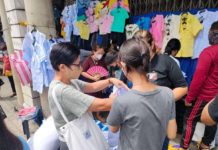PRESIDENT Ferdinand Marcos Jr. is looking at the geomapping of agricultural lands to help farmers with their yields, Malacañang said yesterday.
During his meeting with the Philippine Rice Industry Stakeholders Movement in the Palace on Wednesday, May 31, Marcos said geomapping is widely used by agencies to resolve titling issues and increase farmers’ income.
Geomapping turns raw data into visuals and provides useful information about the site conditions above and below ground.
“Iyong sa geomapping, actually ginagamit na namin ang mapa ng BIR (Bureau of Internal Revenue) at saka NAMRIA (National Mapping and Resource Information Authority). We are putting together everything kasi mahirap naman ipa-survey lahat. So, para alam na natin ‘yung mga areas and it started also with irrigation, sa NIA,” said Marcos, also the country’s concurrent agriculture secretary.
“So from that, ‘yung titling problem na sinasabi natin, magiging mas madali. But at least ma-define na natin ‘yung mga parcels of land and, in that way, alam na natin. So, kung maalis na natin ang titling problem, mas madali na lahat,” he added.
Stakeholders, for their part, cited the lack of access to real-time data as among the challenges to greater yields.
Among other problems include “misaligned programs and activities across agri-related government agencies, inconsistent consultative meetings among the various rice stakeholders, and rice smuggling,” based on the Presidential Communications Office (PCO) release.
The PCO said there were some government interventions to address these already.
This includes the Farm and Fisheries Consolidation and Clustering program, the credit and financing by the Department of Agriculture and the Landbank of the Philippines, and the supposed creation of a climate-smart agriculture infrastructure.
Aside from these, the Marcos administration is forming the National Agricultural and Fisheries Modernization and Industrialization Plan for the development of the agri-fishery sector.
“The recalibration of importation schedule is also being carried out to protect local farmers and industries,” it said.
Marcos earlier approved the Masagana Rice Industry Development Program, which aims to achieve around 97 percent rice self-sufficiency and provide help to farmers. (ABS-CBN News)



